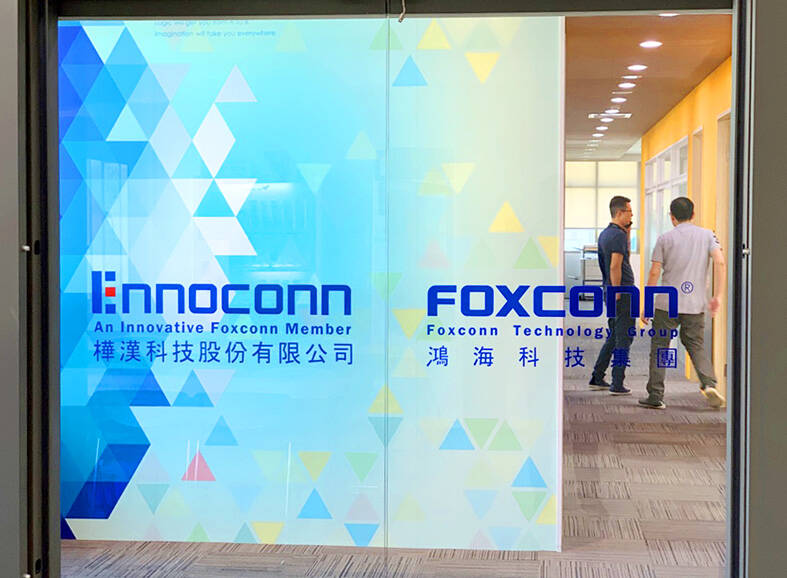Industrial computer maker Ennoconn Corp (樺漢科技) yesterday said it is optimistic about the growing opportunities in the edge computing business and expects significant growth this year in the company’s three major units — design and manufacturing, systems integration and brand business.
With a book-to-bill ratio of about 1.1 percent to 1.15 percent, and an order backlog exceeding NT$180 billion (US$5.42 billion), Ennoconn said it holds clear order visibility and expects the company’s revenue, gross profit and net profit to show stable growth this year.
A book-to-bill ratio above 1 percent indicates increasing demand.

Photo: CNA
Ennoconn Corp, a subsidiary of electronics giant Hon Hai Precision Industry Co (鴻海精密), at an earnings conference in Taipei, said that it plans to set up a new factory in Tennessee to respond to US President Donald Trump’s tariff policy. The facility is expected to begin production in the third quarter of this year.
Revenue last year increased 20.3 percent to NT$146.38 billion from NT$121.64 billion in 2023, thanks to substantial sales contribution from the company’s high-margin cloud solution as a service (SaaS) business in light of the huge opportunities related to digital transformation, artificial intelligence, semiconductors, new energy installations and information security.
Europe remained Ennoconn’s largest market last year, accounting for 35.5 percent of its total revenue, followed by the US with 29.1 percent, China with 9.8 percent and other regions accounting for 24.5 percent.
Net profit rose 21.2 percent to NT$2.74 billion from NT$2.26 billion a year earlier, and earnings per share increased to NT$20.03 from NT$19.01, company data showed.
The company’s board of directors on Friday proposed a cash dividend of NT$12.2 per share, representing a payout ratio of 60.91 percent.
This year, the company expects its design and manufacturing business to benefit from contribution by its partner New York-listed NCR Voyix Corp, a maker of POS systems, ATMs and barcode readers, it said, adding that its branded business, supported by German subsidiary Kontron AG, aims to expand into the aerospace, electric vehicle charging and energy management markets.
Additionally, its system integration business is expected to benefit from increasing semiconductor investment by its automated supply system and turnkey engineering subsidiary, Marketech International Corp (帆宣), in the US, it said.

‘SWASTICAR’: Tesla CEO Elon Musk’s close association with Donald Trump has prompted opponents to brand him a ‘Nazi’ and resulted in a dramatic drop in sales Demonstrators descended on Tesla Inc dealerships across the US, and in Europe and Canada on Saturday to protest company chief Elon Musk, who has amassed extraordinary power as a top adviser to US President Donald Trump. Waving signs with messages such as “Musk is stealing our money” and “Reclaim our country,” the protests largely took place peacefully following fiery episodes of vandalism on Tesla vehicles, dealerships and other facilities in recent weeks that US officials have denounced as terrorism. Hundreds rallied on Saturday outside the Tesla dealership in Manhattan. Some blasted Musk, the world’s richest man, while others demanded the shuttering of his

ADVERSARIES: The new list includes 11 entities in China and one in Taiwan, which is a local branch of Chinese cloud computing firm Inspur Group The US added dozens of entities to a trade blacklist on Tuesday, the US Department of Commerce said, in part to disrupt Beijing’s artificial intelligence (AI) and advanced computing capabilities. The action affects 80 entities from countries including China, the United Arab Emirates and Iran, with the commerce department citing their “activities contrary to US national security and foreign policy.” Those added to the “entity list” are restricted from obtaining US items and technologies without government authorization. “We will not allow adversaries to exploit American technology to bolster their own militaries and threaten American lives,” US Secretary of Commerce Howard Lutnick said. The entities

Taiwan’s official purchasing managers’ index (PMI) last month rose 0.2 percentage points to 54.2, in a second consecutive month of expansion, thanks to front-loading demand intended to avoid potential US tariff hikes, the Chung-Hua Institution for Economic Research (CIER, 中華經濟研究院) said yesterday. While short-term demand appeared robust, uncertainties rose due to US President Donald Trump’s unpredictable trade policy, CIER president Lien Hsien-ming (連賢明) told a news conference in Taipei. Taiwan’s economy this year would be characterized by high-level fluctuations and the volatility would be wilder than most expect, Lien said Demand for electronics, particularly semiconductors, continues to benefit from US technology giants’ effort

Minister of Finance Chuang Tsui-yun (莊翠雲) yesterday told lawmakers that she “would not speculate,” but a “response plan” has been prepared in case Taiwan is targeted by US President Donald Trump’s reciprocal tariffs, which are to be announced on Wednesday next week. The Trump administration, including US Secretary of the Treasury Scott Bessent, has said that much of the proposed reciprocal tariffs would focus on the 15 countries that have the highest trade surpluses with the US. Bessent has referred to those countries as the “dirty 15,” but has not named them. Last year, Taiwan’s US$73.9 billion trade surplus with the US